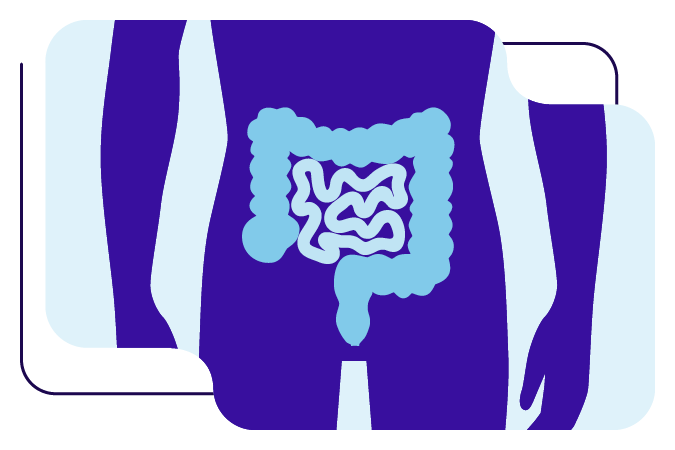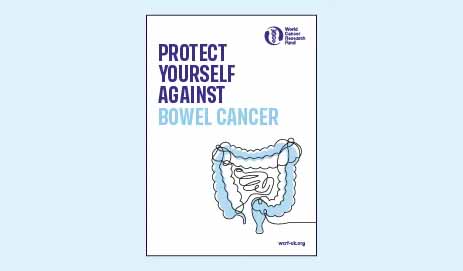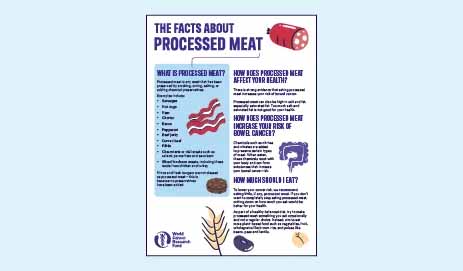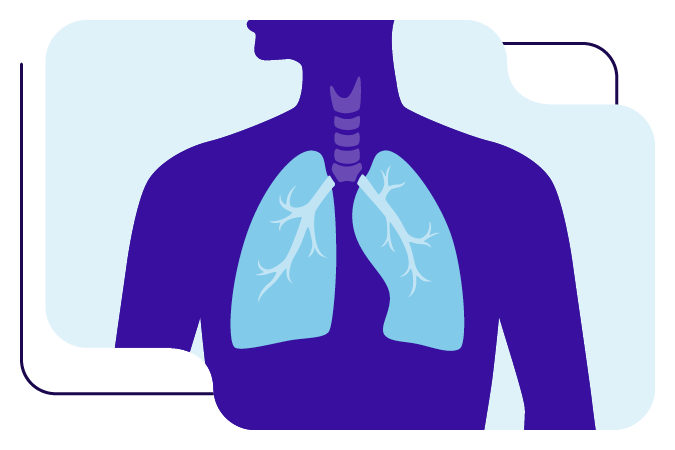Bowel cancer
What is bowel cancer? Find out how common it is, the causes, and expert advice on how to reduce your risk.

On this page
What is bowel cancer?
Bowel cancer is cancer of the colon or rectum. Scientists often refer to bowel cancer as colorectal cancer.
The bowel is part of the digestive system and it’s divided into 2 parts: the small bowel and the large bowel. Nearly all bowel cancers are found in the large bowel, which is made up of the colon and the rectum.
Most of the nutrients from the food we eat are absorbed in the small bowel. Food then passes into the colon where water and any remaining nutrients are absorbed, leaving behind solid waste products. These waste products then move through the colon and the rectum before leaving the body.
The colon contains many types of bacteria, which have potentially important functions. The colon is lined with mucous membranes and contains cells that form part of the body’s immune defence.
Bowel cancer starts when cells in the bowel lining are damaged and grow uncontrollably, forming a tumour.
How common is bowel cancer?
Bowel cancer is the 3rd most common cancer in the UK (2021 data), with around 137 new cases diagnosed every day, and the 3rd most common in the world (2022 data). It is more commonly diagnosed in people over 50.
Men
Bowel cancer is the 2nd most common cancer in men in the UK, and the 3rd most common in men globally.
Women
Bowel cancer is the 3rd most common cancer in women in the UK, and the 3rd most common in women globally.
| Region | Cases | Year |
|---|---|---|
| UK | 49,914 | 2021 |
| World | 1,926,425 | 2022 |
Bowel cancer FAQs
-
What’s the difference between bowel, colon, rectal and colorectal cancer?
The colon and rectum form part of the large bowel. Variations of the name can be used depending on where within the bowel the cancer starts. In research, scientists sometimes look at colorectal cancer as a whole, then separately analyse colon and rectal cancer. For the public, bowel is a more common term.
-
Where can bowel cancer spread?
If bowel cancer is not diagnosed and treated in time, cancer cells can spread from the original tumour site in the bowel to other organs and tissues, where other tumours can then develop. Cancer cells can spread via the blood or lymphatic system.
-
How long can you live with bowel cancer?
If the cancer is identified and diagnosed early, you may have a better chance of surviving the disease and living a long life. However, life expectancy can depend on which bowel cancer stage you’re at.
-
Is bowel cancer curable?
If bowel cancer is caught early enough, it can be treated and destroyed via treatment such as surgery, radiotherapy or chemotherapy. However, there is always the possibility of bowel cancer recurring.
-
When is Bowel Cancer Awareness Month?
In the UK, Bowel Cancer Awareness Month is in April.
Preventing bowel cancer
Bowel cancer is one of the most preventable cancers. There are practical changes everyone can take to reduce their risk of developing it.
Following our Cancer Prevention Recommendations reduces your risk of bowel cancer and other cancers. If you have been diagnosed with cancer, following our Recommendations can reduce the risk of cancer returning.
Find out more on our preventing bowel cancer page.
-
Signs and symptoms of bowel cancer
To prevent bowel cancer from progressing, it’s good to know what to look out for and to recognise the early signs of bowel cancer. Learn about some of the signs and symptoms of bowel cancer.
-
Risks and causes of bowel cancer
Evidence for what causes bowel cancer comes from large population studies (called epidemiology) and biological studies (where scientists look at cells in a laboratory).
You can find out more on our bowel cancer causes and risk factors page.
-
Recurrence and survival for bowel cancer
Our Living with cancer section can help if you are living with bowel cancer.
Many people successfully survive bowel cancer. Unfortunately, survival does not mean cancer-free for the rest of your life. Recurrence of the disease is possible. Find out more about bowel cancer recurrence and what you can do to reduce that possibility.
Help for you
Our free health guides and cookbooks empower people to reduce their risk of getting cancer. We also help those with a diagnosis cope with treatment, live longer, and enjoy a better quality of life.
Order yours today!
Stories
Bowel cancer is such a big topic, it can be easy to forget the people who experience it. We want to give the spotlight to those who have lived with bowel cancer, and how they have incorporated preventative measures into their lives to reduce their risk of bowel cancer returning.

Clubbercise founder Claire on life after bowel cancer
Read Claire’s storyEvidence-base
This is a summary of the strong and limited evidence on diet, weight, physical activity and the risk of colorectal cancer, last reviewed by our Expert Panel in 2018.
There is strong evidence that:
- being physically active DECREASES the risk of colon cancer
- wholegrains DECREASE the risk of colorectal cancer
- foods containing dietary fibre DECREASE the risk of colorectal cancer
- dairy products DECREASE the risk of colorectal cancer
- calcium supplements DECREASE the risk of colorectal cancer
- red meat INCREASES the risk of colorectal cancer
- processed meat INCREASES the risk of colorectal cancer
- alcohol INCREASES the risk of colorectal cancer
- being overweight or obese INCREASES the risk of colorectal cancer
- being tall INCREASES the risk of colorectal cancer
There is some evidence that:
- vitamin C may decrease the risk of colon cancer
- consuming fish may decrease the risk of colorectal cancer
- vitamin D may decrease the risk of colorectal cancer
- multivitamin supplements may decrease the risk of colorectal cancer
- low consumption of non-starchy vegetables may increase the risk of colorectal cancer
- low consumption of fruit may increase the risk of colorectal cancer
- foods containing haem iron may increase the risk of colorectal cancer
Full references, pathogenesis and a summary of the mechanisms comes from our Diet and Cancer Report (2018). Browse our resource library for the chapter on colorectal cancer.
Other causes of colorectal cancer
In addition to the findings on diet, nutrition and physical activity outlined above, other established causes of colorectal cancer include:
-
Smoking
Smoking 40 cigarettes (2 packs) per day increases risk of colorectal cancer by about 40% and nearly doubles the risk of colorectal cancer death.
-
Other diseases
Inflammatory bowel disease (Crohn’s disease and ulcerative colitis) increases the risk of colon cancer.
-
Medication
Long-term use (5 years or more) of at least 75 mg per day of the non-steroidal anti-inflammatory drug aspirin can reduce the risk of colorectal cancer. Hormone therapy in post-menopausal women decreases colorectal cancer risk.






